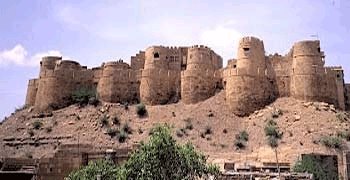 JAISALMER, INDIA — For centuries, the colossal sandstone fort that looms over this dusty town has withstood the harshly arid climate of the Rajasthani desert. Inside the citadel's honey-colored walls, tenacious warrior families survived sieges and endured droughts by hoarding every drop of water.
JAISALMER, INDIA — For centuries, the colossal sandstone fort that looms over this dusty town has withstood the harshly arid climate of the Rajasthani desert. Inside the citadel's honey-colored walls, tenacious warrior families survived sieges and endured droughts by hoarding every drop of water.These days, though, the problem with water isn't one of scarcity. Instead, Jaisalmer is struggling with a surfeit of the stuff, an overabundance that is ravaging the historic stronghold in a way eight centuries and countless invading armies failed to do.
Residents and visitors to the fairy-tale fort now enjoy instant access to piped-in water. What was once a precious resource flows freely from the tap, gurgles down toilets and fills the washing machines of hundreds of residents and countless hotels. During the busy tourist season, which has just begun, consumption per person is more than 10 times what it was two decades ago.
But what gets channeled in doesn't always find a way out. Thanks to woefully inadequate drainage and sewage systems, runoff has seeped into the foundations and walls of the fort, literally weakening its defenses.
Preservationists liken the fort's predicament to a sandcastle being doused with a bucket of water. To the naked eye, the citadel and its rocky perch appear impregnable, but water easily erodes the sandstone and the soft bentonite clay that underlies much of Jaisalmer.
No comments:
Post a Comment